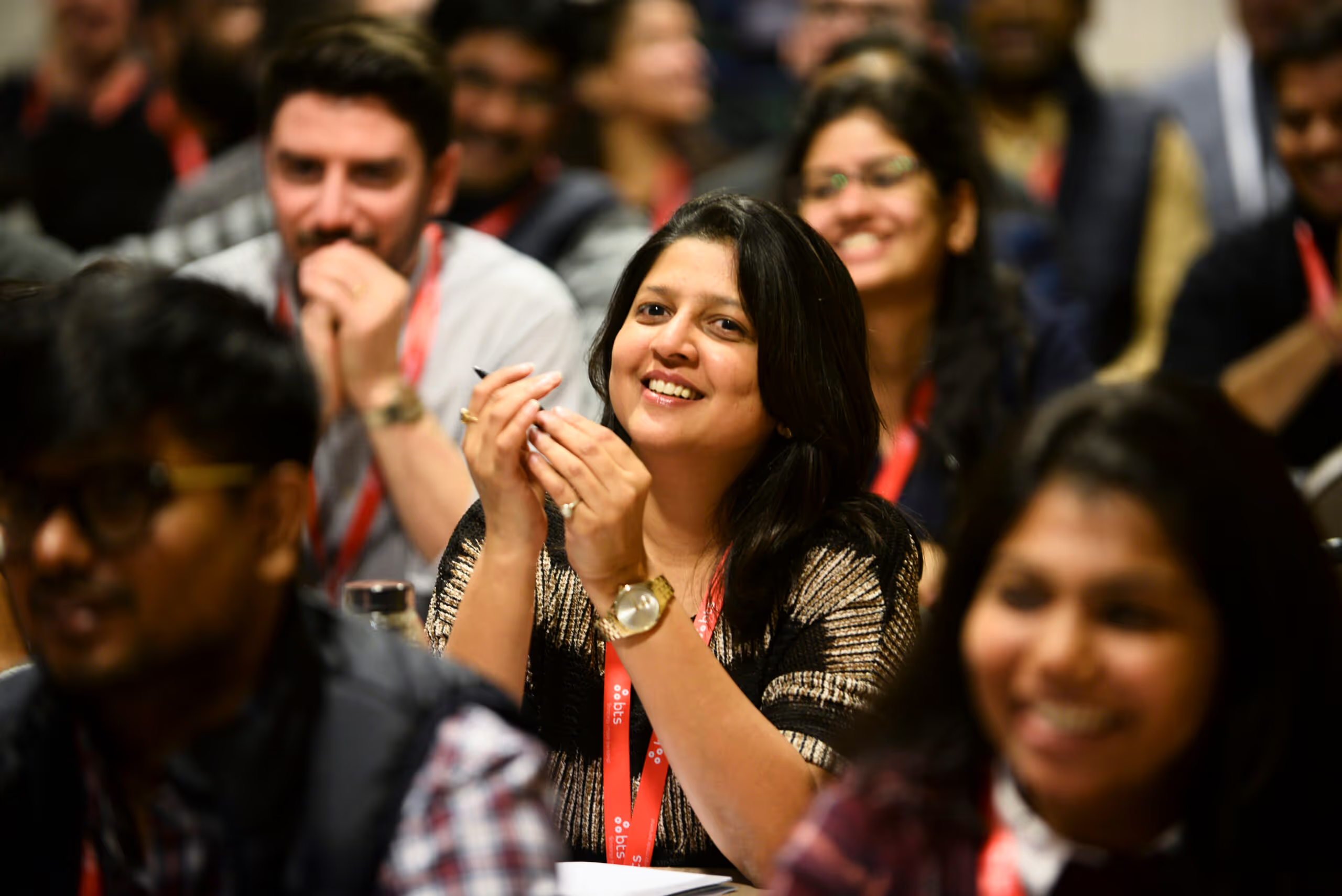3 tips for a successful “un-conference”

Given widespread economic uncertainty, why spend this time together instead of pursuing potential clients?The time spent enabled leaders to gain inspiration, clarity, and confidence. They reflected on 2022’s client challenges and were humbled by their colleagues’ remarkable depth, expertise, and creativity. As a result of the event, leaders were refreshed. They returned to their markets with new ideas and insights that would enable them to make smarter, better sales.What made this conference so successful? It was the “un-conference” conference. Energizing and collaborative rather than dull and death by powerpoint, this “un-conference” utilized three critical factors that made it a success. These key tips are universally applicable and will make all the difference for your own organization-wide gatherings.
- Executive sponsorship that is constructive – not destructive.Jessica Skon, Global CEO of BTS, served as executive sponsor for the conference and was personally invested in its success. She recognized the opportunity for the gathering to ignite the organizations’ leaders, inspire new ways to partner with clients, and uncover opportunities for growth and better serving clients.Typically, executive sponsors serve on a steering committee, occasionally reviewing the event’s content and flow. Too often, executive sponsors are guilty of co-opting those meetings, requesting major last-minute changes that cause rework and stress.Jessica, however, consistently clarified priorities and surfaced gaps in alignment she’d noticed over the past two quarters. Through daily interaction, Jessica, her senior team, and the conference designers refined their goals for the gathering, ensured the flow of the programming, and defined outcomes that would justify the time investment.Also, in the weeks leading up to the meeting, Jessica held office hours during which facilitators could practice and get feedback. These mini working sessions drove dialogue about the firm’s future and strengthened consultants’ ownership of organization’s strategy.
- Intentional program design. Conferences are often a grab-bag of non sequitur presentations. To shift your conference to an “un-conference,” draw a red thread through all presentations by writing an explicit narrative.Jessica and the conference designers involved scores of their colleagues thoughout the content development process to co-create client stories, simulations, frameworks, lessons learned, and quick updates that would make sense to all attendees as a complete program.3. Embed opportunities for learning.Authorship is ownership. Strategy execution runs on conversation, not lengthy presentations by a sage on stage. Provide opportunities for people to share findings from their most challenging client work. Then, after each learning moment, build in opportunities for people to share thoughts, collaborate, and ideate together.Discussion is the key that will enable your team to process new information, internalize the learning, and come up with new approaches. You’ll be surprised and amazed by what your team is able to create. By providing ample opportunities for people to share challenges and discuss new approaches, you will create optimal conditions for learning, alignment, and growth.
By following these “un-conference” rules, BTS was able to create an experience that accelerated sales in 2023. Rather than starting from behind after taking a week to sit through a series of unhelpful PowerPoints, consultants left the experience ready to help clients solve problems in new ways – to help them create their own great “un-conference” memories.By leveraging your executive sponsor effectively, taking an intentional approach to program design, and building in opportunities for learning at every step, you too can hold a gathering that builds community and strengthens your company culture.
Related content
Related content

From top-down to judgment all around: The AI imperative for organizations
Each business revolution has reshaped not only how businesses operate, but how they organize themselves and empower their people. From the industrial age to the information era, and now into the age of artificial intelligence, technology has always brought with it a reconfiguration of authority, capability, and judgment.
In the 19th century, industrialization centralized work and knowledge. The factory system required hierarchical structures where strategy, information, and decision-making were concentrated at the top. Managers at the apex made tradeoffs for the greater good of the enterprise because they were the only ones with access to the full picture.
Then came the information economy. With it came the distribution of information and a need for more agile, team-based structures. Cross-functional collaboration and customer proximity became competitive necessities. Organizations flattened, experimented with matrix models, and pushed decision-making closer to where problems were being solved. What had once been the purview of a select few, judgment, strategic tradeoffs, and insight became expected competencies for managers and team leads across the enterprise.
Now, AI is changing the game again. But this time, it’s not just about access to data. It’s about access to intelligence.
Generative AI democratizes access not only to information, but to intelligent output. That shifts the burden for humans from producing insights to evaluating them. Judgment, which was long the domain of a few executives, must now become a baseline competency for the many across the organization.
But here’s the paradox: while AI extends our capacity for intelligence, discernment, the human ability to weigh context, values, and consequence, is still best left in the hands of human leaders. As organizations begin to automate early-career work, they may inadvertently erase the very pathways and opportunities by which judgment was built.
Why judgment matters more than ever
Deloitte’s 2023 Human Capital Trends survey found that 85% of leaders believe independent decision-making is more important than ever, but only 26% say they’re ready to support it. That shortfall threatens to neutralize the very productivity gains AI promises.
If employees can’t question, challenge, or contextualize AI’s output, then intelligent tools become dangerous shortcuts. The organization stalls, not from a lack of answers, but from a lack of sense-making.
What organizations must do
To stay competitive, organizations must shift from simply adopting AI to designing AI-aware ways of working:
- Build new learning paths for judgment development. As AI replaces easily systematized tasks, companies must replace lost learning experiences with mentorship, simulations, and intentional development planning.
- Design workflows that require human input. Treat AI as a co-pilot, not an autopilot. Embed review checkpoints and tradeoff discussions. Just as innovation processes have stage gates, so should AI analyses.
- Make judgment measurable. Assess and develop decision-making under ambiguity from entry-level roles onward. Research shows the best learning strategy for this is high-fidelity simulations.
- Start earlier. Leadership development must begin far earlier in career paths, because judgment, not just knowledge, is the new differentiator.
What’s emerging is not just a flatter hierarchy, but a more distributed sense of judgment responsibility. To thrive, organizations must prepare their people not to outthink AI, but to out-judge it.

BTS acquires Nexo to strengthen its position in Brazil and Latin America
P R E S S R E L E A S E
Stockholm, May 5, 2025
STOCKHOLM, SWEDEN – BTS Group AB (publ), a leading global consultancy specializing in strategy execution, change, and people development, has agreed to acquire Nexo Pesquisa e Consultoria Ltda., Nexo, a boutique consulting firm headquartered in São Paulo, Brazil.
Nexo has been growing continuously since it was founded in 2017. With revenues of approximately 12 million Brazilian Reales (approx. 2.1 million USD) in 2024, and a highly capable team of 21 members, Nexo has built a strong reputation for delivering transformative projects in strategy, innovation, leadership, and culture.
Nexo collaborates with a great portfolio of clients across sectors such as financial services, consumer goods, and technology, assisting both local and global companies in navigating uncertainty, unlocking creativity, and activating strategy through people. Their work encompasses culture transformation, leadership development, employer value proposition, innovation culture, and vision alignment – supported by proprietary methodologies and frameworks.
BTS currently operates in Brazil servicing both local and multinational clients with a team of 13 employees. By acquiring Nexo, BTS not only increases the Group’s footprint in Brazil but also adds significant capabilities in culture and transformation services. Nexo’s client base has limited overlap with BTS, creating strong growth potential and synergy opportunities.
“Nexo is known for helping leaders and organizations tackle some of the most complex, human-centered challenges with creativity, empathy, and strategic clarity and the Nexo team is loved by their clients,” says Philios Andreou, Deputy CEO of BTS Group and President of the Other Markets Unit. “Their products and services complement and elevate our existing offerings, especially in culture transformation, and we are thrilled to welcome the Nexo team to BTS.”
“We’re excited to join BTS. We’ve long admired BTS’s approach and unique portfolio to support large organizations and leaders in connecting strategy with culture across the organization,” says Andreas Auerbach, co founder of Nexo. “Becoming part of BTS, allows us to scale our impact and bring more value to our clients while staying true to our values and culture,” adds Mariana Lage Andrade, co-founder of Nexo.
Upon completion of the transaction, Nexo’s business and organization will merge with BTS Brazil. Nexo’s founders will assume senior management roles in the joint operation.
The acquisition includes a limited initial cash consideration. Additional purchase price considerations will be paid between 2026 and 2028, provided Nexo meets specific performance targets. A limited portion of any such additional purchase price considerations will be paid in newly issued BTS shares. The transaction is effective immediately.
BTS’s acquisition strategy continues to focus on broadening our service portfolio, expanding our geographic reach, and enhancing our capabilities to support future organic growth in a fragmented market.
For more information, please contact:
Philios Andreou
Deputy CEO
BTS Group AB
philios.andreou@bts.com
Michael Wallin
Head of investor relations
BTS Group AB
michael.wallin@bts.com
+46-8-587 070 02
+46-708-78 80 19

High-performing teaming
Work today is too complex for individuals to succeed in isolation. Almost every critical decision, innovation, or transformation depends on teams working effectively together. Leaders rely on their teams to deliver results. Teams, in turn, rely on their leaders to create the conditions where performance is possible. This exchange, what leaders need from their teams, and what teams need from their leaders, sits at the heart of what we call teaming.
When teaming is strong, leaders get what they need from their teams [creativity, resilience, execution] and teams get what they need from leaders [direction, support, and the conditions to thrive]. It’s how strategy becomes action, how uncertainty becomes opportunity, and how businesses stay competitive in a fast-changing world.
